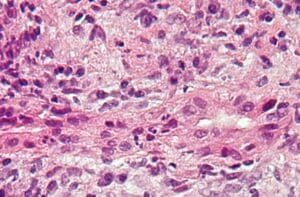
Intermediate magnification micrograph of primary biliary cholangitis, from a liver biopsy with H&E stain. Image by Nephron, licensed under CC BY-SA 3.0, via Wikimedia Commons.
Now the vice president and head of medical affairs at CymaBay Therapeutics, Mary Standen‘s passion for healthcare was sparked in her high school years when her mother was diagnosed with breast cancer. Though her mother eventually recovered, Standen was galvanized to help provide both emotional support and practical assistance, such as administering weekly injections. The experience made Standen feel empowered to join her mother’s battle against cancer. “I felt I had it in my power to help with the fight,” Standen said.
The experience proved to be the initial formative experience that propelled Standen into a career dedicated to healthcare and patient advocacy. “After earning her bachelor’s in Psychology from Emory University, Standen completed a bachelor of Science in registered nursing at New York University. “I immediately loved soaking up and learning from the various experiences that I had through rotations as a nurse in nursing school,” she recalled.
Hands-on experience
Beginning her healthcare career as a practicing nurse, Standen gained diverse experiences in patient care across multiple specialties. She first worked with oncology patients at Memorial Sloan Kettering Cancer Center. She then moved to Reproductive Medicine Associates of New York, where she provided support for infertility. Standen later developed expertise in liver diseases at The Mount Sinai Hospital where her responsibilities included acting as a sub-investigator in clinical trials for new antiviral treatments for chronic hepatitis B and C.
A new chapter in pharma

Mary Standen
A pharma awakening for Mary Standen occurred when a friend who had transitioned into the industry inspired her to follow a similar career path. “She was developing a new therapy for hepatitis C, and I really saw the impact that you could have in drug development on impacting even more people’s lives,” Standen recounted.
This paved the way for her role at Gilead Sciences, where she focused on the hepatitis C pipeline as a clinical trial management associate. After her tenure at Gilead, Standen transitioned to Genentech, serving as a senior clinical manager in hematology oncology. She then moved to Intercept Pharmaceuticals, working as the director of global medical affairs. Standen would eventually join CymaBay Therapeutics in July 2018, where she currently leads medical affairs.
Guided by mentors
Reflecting on her career trajectory, underscores the role of leading experts as a source of inspiration. “The doctor I was working with at Mount Sinai was a top hepatologist in the field, pioneering the way when all these new hepatitis C drugs were coming out,” she recalled. “I was also seeing PBC patients, which is the current condition we’re developing a drug for at CymaBay. This physician became a mentor to me, introducing me to many different roles within pharmaceuticals.”
Though Standen benefited from strong healthcare mentorship, she acknowledges that it would have been helpful to have had more access to female leaders as she navigated the early stages of her career. “One of my hopes is to make those leaders more visible for others who are just starting in their career,” she said.
Diversity and inclusion are at the top of Standen’s priorities. “To me, the reason that diversity is so important is because it really allows every single individual to identify people that they feel that they can relate to in a certain way,” Standen said.
For women looking to follow a similar path, Standen advises that beyond supportive work environments, professional women’s networks provide support when internal mentors prove scarce.
Addressing unmet needs
Presently Standen is focused on shifting the standard of care for primary biliary cholangitis (PBC), a chronic liver disease. PBC involves symptoms such as intense itching (pruritis) and fatigue. As the condition evolves, it can progress to complications such as jaundice, abdominal pain, spleen enlargement, weak and brittle bones and weight loss. In severe cases, it can lead to an advanced stage of liver dysfunction.
Despite available treatments targeting symptoms or disease pathways, many patients still face significant challenges. As Standen underscores, current options often fall short in adequately improving quality of life.
One of the main challenges Standen identifies is the underappreciation of how burdensome PBC symptoms can be. Symptoms like itching, can lead to sleep disturbances and worsened fatigue. This understanding drives CymaBay to develop therapies not only slowing progression but significantly improving lives by reducing symptoms. “There really hasn’t been a therapy able to do both at once,” she says.
Topline seladelpar phase 3 data demonstrate the PPAR agonist’s potential to become the first therapy in decades addressing both disease progression and quality of life for inadequately controlled patients.
The placebo-controlled phase 3 RESPONSE trial, involving 193 patients with PBC, recently yielded promising data. Patients treated with seladelpar were significantly more likely to achieve the primary composite endpoint compared to placebo (61.7% vs 20%). Notably, 25% of those on seladelpar realized normalization of key liver enzyme levels, an important marker of treatment response, while 0% of placebo patients did. Additional liver enzyme and symptom improvements were also observed.
Regulatory filings are underway for seladelpar.
Standen reflects on the seladelpar’s progress, noting “when you’ve worked on a drug for years and then see positive late-stage data, it’s rewarding. You feel excited about the future improving patients’ lives.”
Filed Under: Hepatology, Women in Pharma and Biotech



